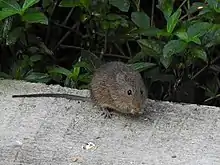| Jaliscan cotton rat | |
|---|---|
 | |
| Scientific classification | |
| Domain: | Eukaryota |
| Kingdom: | Animalia |
| Phylum: | Chordata |
| Class: | Mammalia |
| Order: | Rodentia |
| Family: | Cricetidae |
| Subfamily: | Sigmodontinae |
| Genus: | Sigmodon |
| Species: | S. mascotensis |
| Binomial name | |
| Sigmodon mascotensis J. A. Allen, 1897 | |
The Jaliscan cotton rat or Mexican cotton rat (Sigmodon mascotensis) is a species of rodent in the family Cricetidae. It is found only in Mexico. They commonly have brown fur with white fur on the belly.[2] They are ground-dwelling and prefer open habitats.[3]
Distribution and habitat
The Mexican cotton rat is endemic to Mexico and is distributed along the western coast of the country.[1] This area is located in the tropical deciduous forest biome, and the Mexican cotton rat prefers to reside in the open, grassy areas with dense areas of ground-level vegetation and little to no trees.[3] However, these rats will occupy a variety of habitats when their populations grow in size.[3] The Mexican cotton rat coexists cooperatively with other similar rodents in the ecosystem.[3]
Phylogeny
The Mexican cotton rat belongs to the family Cricetidae in the order Rodentia.[4] While it used to be considered a subspecies of Sigmodon hispidus (Hispid cotton rat), the Mexican cotton rat was designated as its own species after an ancestral karyotype study.[4] The Mexican cotton rat and the Hispid cotton rat can be distinguished chromosomally as well as by different skull characteristics.[2]
Hantavirus
Hantavirus is spread to humans through exposure to rodent fecal matter or by rodent bites and can become fatal.[5] Different species of rodents can carry different strains of hantavirus.[5] The Mexican cotton rat has been found to be one of the more prevalent carriers of hantavirus due its high amount of hantaviral antibodies.[5] The hantavirus that the Mexican cotton rat carries is a unique genotype of this virus, which is also carried by Oryzomys couesi (Coues's rice rat).[5]
References
- 1 2 Álvarez-Castañeda, S.T.; Castro-Arellano, I.; Lacher, T.; Vázquez, E. & Arroyo-Cabrales, J. (2017) [errata version of 2016 assessment]. "Sigmodon mascotensis". IUCN Red List of Threatened Species. 2016: e.T20216A115157887. doi:10.2305/IUCN.UK.2016-3.RLTS.T20216A22355790.en.
- 1 2 Martínez-Chapital, Sara T; Schnell, Gary D; Sánchez-Hernández, Cornelio; Romero-Almaraz, María de Lourdes (11 September 2017). "Sigmodon mascotensis (Rodentia: Cricetidae)". Mammalian Species. 49 (954): 109–118. doi:10.1093/mspecies/sex013.
- 1 2 3 4 Poindexter, Cassie J.; Schnell, Gary D.; Sánchez-Hernández, Cornelio; Romero-Almaraz, María de Lourdes; Kennedy, Michael L.; Best, Troy L.; Wooten, Michael C.; Owen, Robert D. (July 2012). "Variation in habitat use of coexisting rodent species in a tropical dry deciduous forest". Mammalian Biology - Zeitschrift für Säugetierkunde. 77 (4): 249–257. doi:10.1016/j.mambio.2012.03.004.
- 1 2 Romanenko, S A; Perelman, P L; Trifonov, V A; Graphodatsky, A S (16 November 2011). "Chromosomal evolution in Rodentia". Heredity. 108 (1): 4–16. doi:10.1038/hdy.2011.110. PMC 3238120. PMID 22086076.
- 1 2 3 4 Chu, Yong-Kyu; Owen, Robert D.; Sánchez-Hernández, Cornelio; Romero-Almaraz, Ma. de Lourdes; Jonsson, Colleen B. (February 2008). "Genetic characterization and phylogeny of a hantavirus from Western Mexico". Virus Research. 131 (2): 180–188. doi:10.1016/j.virusres.2007.09.007. PMID 17963942.
- Musser, G. G. and M. D. Carleton. 2005. Superfamily Muroidea. pp. 894–1531 in Mammal Species of the World a Taxonomic and Geographic Reference. D. E. Wilson and D. M. Reeder eds. Johns Hopkins University Press, Baltimore.
